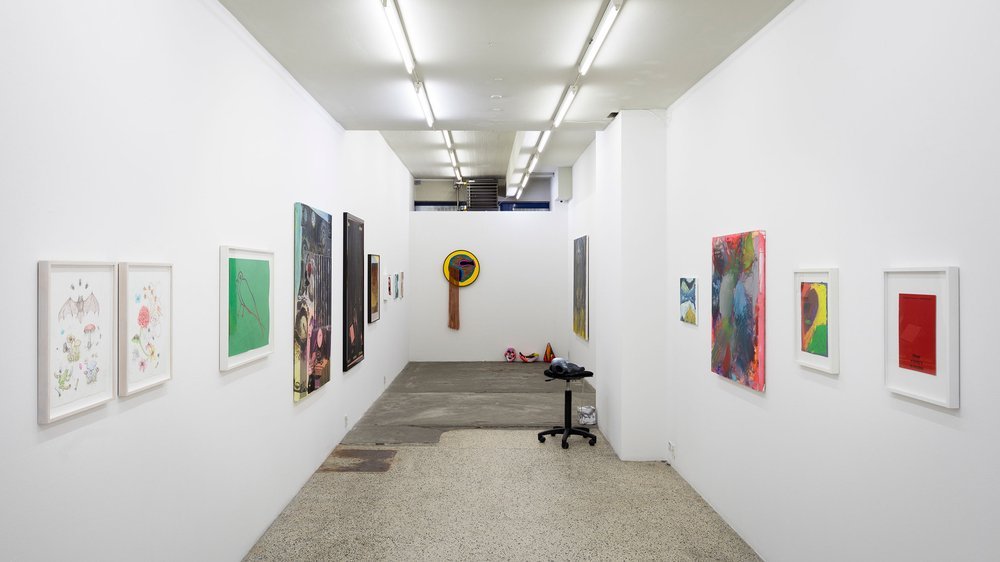Removing the borders of art and society.
An interview with Italian artist Riccardo Matlakas.
Artist Link: matlakas.co.uk
With the numerous painters, musicians, poets, writers, and performers that I have spoken with in the last few years, there have been a few instances where – based on the way they conduct themselves and formulate their answers – I come to the conclusion that there was no other calling that this person could be in our world than that of an “artist.”
These particular individuals’ outlooks towards everyday life, their daily practices, and their personalities contain such a peculiar perspective towards the world, that imagining them along any other path than that of someone creating art seems ridiculous. Trying to picture them as a store clerk, a plumber, a businessperson, or any number of other pedestrian careers, just doesn’t work.
Such is the case with Italian artist Riccardo Matlakas. Now, there is a very good chance that you might have spotted Matlakas performing some of his works on the street of London – where he now resides. Or in the PyeongChang Cultural Olympics on the border of South and North Korea (if that is somewhere you happen to find yourself). Or in Kharkiv, Ukraine. Or in Amman, Jordan. Or in dozens of cities all around the world.
You may have been lucky enough to see some of his paintings on exhibit in Seoul, Gwangju, St.Petersburg or Helsinki. Or you might have come across one of the countless interviews, workshops, or lectures that he has done in cities across the world.
Regardless of whether you have come in contact with Riccardo, or his work, the one thing that becomes clear once you do, is that he is a man that lives every second of his life as an artist and a creator.
He is shameless in his expressions of public performance. He is thoughtful, yet provocative, in the way he presents himself and his work. And he is completely untethered to any stigmas or categorizations of what should or should not be done in his exploration of creativity.
We first came in contact with Riccardo when he contacted us through one of our recurring Artist Invites on Ello. At first, it was hard to place him. He submitted a painting, but upon further research, we found a robust oeuvre of provocative and political performance. All things considered, as I watched some of the interviews with Matlakas that he has listed on his website, I became more and more curious about how he sees himself as an artist, and what kinds of daily practices direct the types of art that he works with.
Your career as an artist is genuinely quite fascinating to dig into because it’s almost as if you refuse to be put into a categorization as an artist. You paint, you dance, you perform, you sculpt. So to get a better understanding of who you are, can you tell if there was a moment in your life when you decided that expressing yourself creatively would be your life’s mission?
Good point! I realized, in fact, that there is so much to do creatively and that one life would be not enough. So when I was working part-time and kept my art practice I felt frustrated as I felt that even one day a week of work would obstruct the flow of it. I also felt that every job we do, even the easier one, is a responsibility in society and that we all contribute to it in some ways.
I believe art is everywhere in our society and in every job already existing, and some people put that particular magic which can be measured with art. I’ve had the opportunity to travel to many countries through my work and, at some point, it became impossible to have any job as I was spending very little time in London, where I am based.
I’ve always felt like exploding inside every time I did something only for money. I felt time was stolen off my life. I feel there is so much injustice in the world, even in the way society structured work hours. A series of events lead me to join many residencies abroad and to work persistently as an artist, and this is something I keep doing with love, hard work, and awareness.
So if you need a time-frame of when exactly, I am not sure, but a series of events definitely brought me to keep trusting that things will come if I work honestly and remain tue with myself, without greed, it might sound spiritual or religious, but it’s nothing like that. This is just a proven statement that was risen by my own experience on my own skin.
When you enter into the creation and research period of your work, how do you come to a decision on which medium you will use for the output of the work – performance, painting, etc?
It’s all so exciting and frustrating at the same time, writing, sketching, reading, and daydreaming is all part of it. I think the media usually emerges as a force and I am very flexible.
Many times, I follow the origin of what is required, also according to where I am in the world. Each context requires different means of expression, where sometimes we can push the borders of what is possible and some other times better not. Tuned Intuition is a good friend in many cases.
Lately, I am enjoying starting with performative actions, which are filmed and photographed and which have usually a relic of my performance that shows up in an installation during an exhibition – so that I end up having a multi-disciplinary final display. I love this, it gives me so much freedom.
Regarding painting, it’s a media I will always love, particularly street art as it’s an immediate confrontation with the public. Even the most naïve work in public spaces has something different to say in a gallery setup – with the difference that the people in the street, who were not previously educated about the work, can encounter the art. In fact, I create many performative actions in the streets that sometimes leaves the public confused, but what I really like about it, is the fact that it creates conversations, raising questions and activate the power of imagination.
Take me through some of your practices that work to develop the vocabulary for your work – the style for your paintings, the concepts for your performance art, the choreography for your dance, etc.
Let me start from the painting which I put in the shadow of the previous questions…my particular style of painting came from my deep interest in the tracing of bold lines on a white background.
Looking at the empty space surrounding and surrounded by a black line, it has such a strong impact on my eye. And each line follows breathing, it’s traced life, a traced journey of decision which merges with the limited space of a canvas. I love this and each line I create exists because it was required, at least for my perception at the time I created the work.
When I create a figure, I always think that that figure is empty anyway, as I use the white background to fill it up.
I feel very close to that of a calligrapher when I paint, but I also feel also that a canvas is like a stage and it’s composition it’s equal to photographed dance moves…I am nowadays very attracted by stillness and the kinesthesia of everything I trace.
I feel my practice cannot be identified within a particular media anymore as I am living my life fully, within the premises of art. The paintings I create nowadays, want to be healers for society containing a cathartic attitude to it, but they show also a witty view of how society itself can be such an absurd construction of fundamentals, against nature.
The concepts of my performances rise usually after researching about a country or a place. After so much traveling, I noticed that some of the problematics are the same at essence, so I am bringing all the concepts closer to spiritual growth and finding an analogy that connects humans and its problematics in a more universal way rather than being delimitated by country’s borders.
I also feel that I am constructing myself as a human being, through my readings, travels, and experiences. I am becoming my own nation but with open borders.
I love diversity, and the world should definitely be more open to it, it should be welcome. My dance keeps existing in everything I do, tension, stillness, and direction is everywhere, but when I dance, I feel I can truly be free, and I find real inputs when I improvise. There is a lot of potential there.
I am conceptually and intellectually fighting with a the instinctual nature of dance on sound, it is stronger than me, I still feel this primordial attitude to dance is very much rooted in human nature, so I am still pondering on this and leaving professionally more space to performance art even though the dancer inside me is always present.
Tell me about some of the ideas that you are researching currently?
I am currently into re-educating myself as I believe in this society the fundamental human education is still unknown in most places. I am trying to understand, and therefore, I am noticing in my work some kind of deconstruction and re-construction of what already exists. It’s an open playground, but full of responsibilities. Art and science have a lot to do with each other, so I try to look deep into myself in order to understand this. Meditation is a great tool, and after years of it, I feel it penetrated me very deeply after forging me positively. I have currently many ideas which will be applied when time and finance allow. I usually have the tendency not to say what I am doing as I would like to do it first otherwise it ends up being a blah-blah-blah.
How is the research manifesting itself in your daily artistic practice?
I am curious, I feel there is a lot to learn and to discover – everything manifests in terms of understanding first (in my head, imagination) and then through what I create, which can be a visible manifestation of my thoughts process, for myself as well.
When I revisit, I try to examine each component and if what I created is universal enough in order still not be entertainment but keeping universal, looking at the fundamentals for our growth.
Research is research, and it takes different forms, not only reading, but traveling, dreaming, having coffee and observing, fasting and observing, being still and observing, but also being distracted and observing myself being distracted…it’s all a huge research which manifests itself when I am aware.
Looking back across the oeuvre of your work, is there a defining work or period that you are most proud of?
Whenever I look back, I can see that I grew a lot as a human being and an artist, and feels good to see that I manage to do already so much. I don’t think there is any particular work, but for sure there are works which I find iconic for , and I am happy to share.










